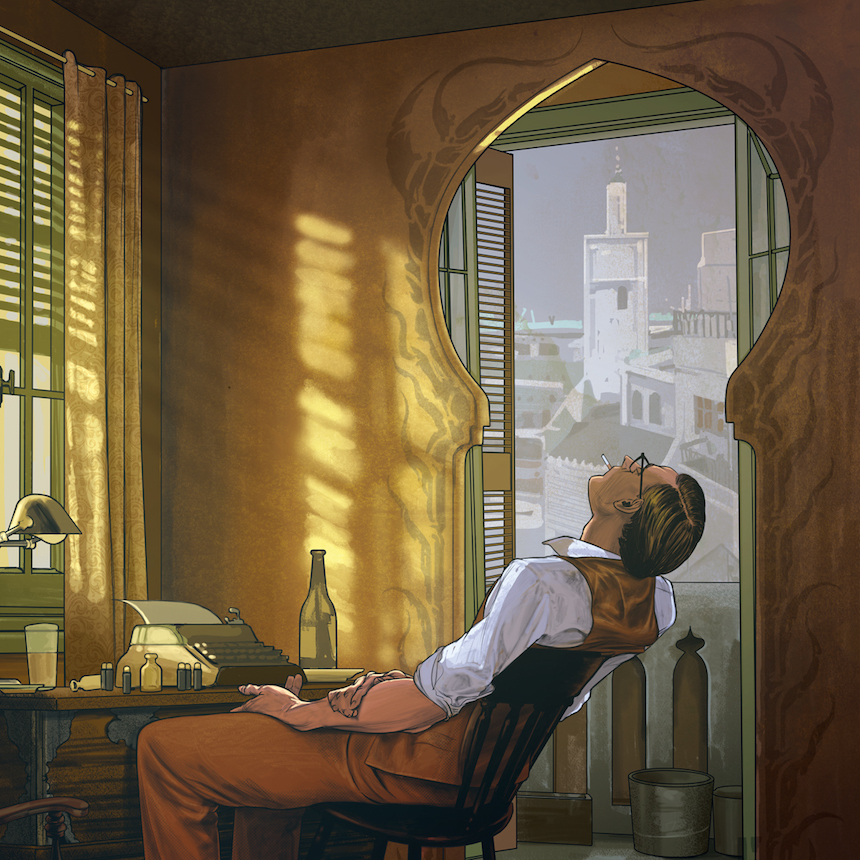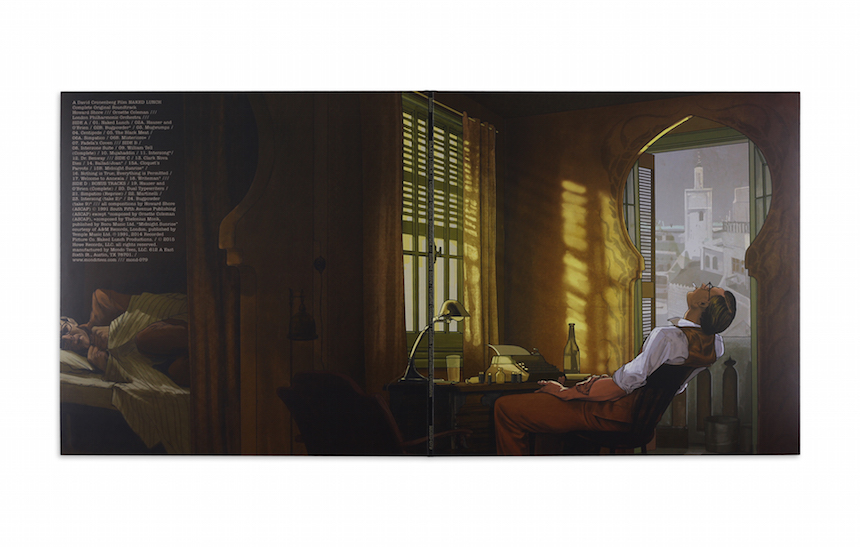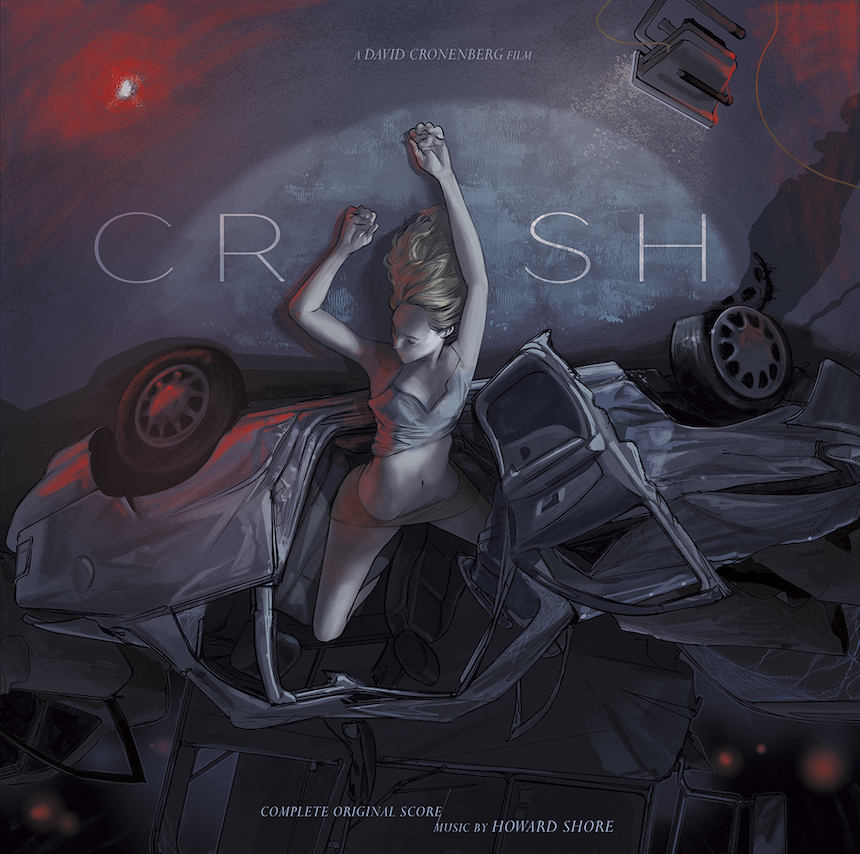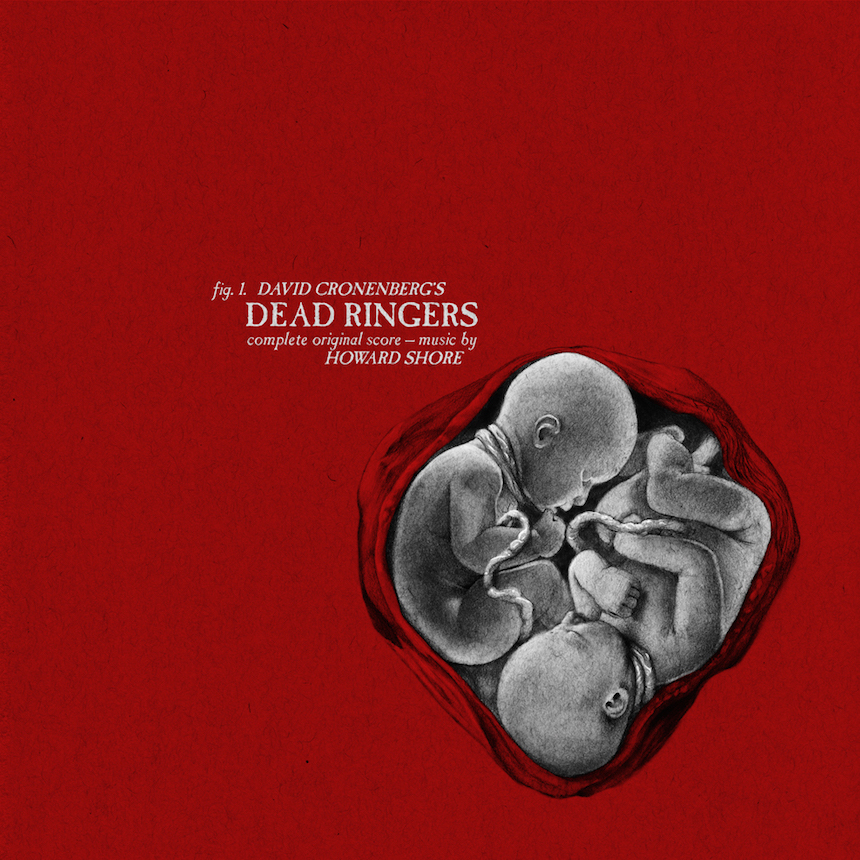Mondo/Death Waltz Tackle Three More Shore-Cronenberg Scores
While David Cronenberg’s contributions to cinema have not been understated, the focus has, historically, been paid towards the director’s unique visual and metaphorical blend of sex and violence.
He has contributed an immense amount to the body horror subgenre — in many ways, so much so that his name has become synonymous with it — but his work has transcended ‘genre’ films circles, achieving a sense of unified acclaim throughout nearly all annals of cinema appreciation. One aspect, however, that often is overlooked when his work is being discussed is the music. Along with his long-time collaborator Howard Shore, the soundtracks of David Cronenberg’s films have featured an equally measured, impressive blend of raw emotion than that of the visuals.
As part of an ongoing effort to collect and re-issue these works, Mondo and Death Waltz Recording Company struck a deal with Howe Records (Howard Shore’s company) to release a number of Cronenberg-Shore records, remastered and featuring stunning new artwork and packaging design by the ever-reliable roster of artists in Mondo’s stable. Launching with the LP release of Scanners/The Brood, Mondo and Death Waltz went back to Shore to release three of the composer’s other collaborations with Cronenberg and among some of the Shore’s best work: Naked Lunch, Crash, and Dead Ringers.
Launching Death Waltz Recording Co. in 2011, Spencer Hickman can — if not completely — largely be credited for launching the vinyl soundtrack revival movement that has, in the last few years, ramped up at an incredible speed. Where there used to be only a handful of releases available in any given month, it would seem like there are, now, hundreds of announcements dropping per week.
With the Cronenberg records as well as the long-awaited score for Twin Peaks freshly pressed and a few more heavy hitters on the horizon, Screen Anarchy caught up with Hickman to talk about the history of the label, how the merger with Mondo has effected work, and what we can look out for in the future.
Click through the gallery below to read our interview with Spencer Hickman and more about the releases.





Each of these records is notable for unique reasons but Naked Lunch emerges as the most ambitious. Teaming with the late, great jazz saxophonist Ornette Coleman, Howard Shore concocted a complex and feverous score for the Burroughs adaptation. When viewed along the visuals, the score has the tendency to blend in; the film is such an assault on the senses that the equally raucous composition falls in line. When detached from the visuals, however, one can get a far more nuanced, deep understanding of the work that went into its creation. Naked Lunch is more than a great score, it’s a great album. While this may sound like an unnecessary comment, it is not. There are plenty of great scores that are not so kind on the ears when detached from their original purpose.
Shore/Coleman work both in unison and at odds throughout the album in order to create a structured sense of frenzy. Broken beat crescendos consistently build towards seemingly no conclusion, while Coleman’s restless sax screams notes of ecstasy. All the while, Shore conducts a moodish orchestration in the tune of noir. Close your eyes and you can envision Peter Weller’s Bill Lee crashing on his typewriter keys in beat with the band, the wet and dark streets of Tangier just outside his window.
Screen Anarchy: Prior to Death Waltz, you’ve had other notable contributions to horror and music that people might not be aware of. Can you talk a little about what you worked on before DWR, especially the zines you worked on?
Spencer Hickman: The fanzine [Psychotic Reaction] was something I just wanted to do. I used to read stuff like Steve Puchalski’s Shock Cinema, and there was this local fanzine called Pretty Poison, run by this guy called Gary Gittings. He was older than I was and he totally got me into all these weird, totally fucked up juvenile delinquent films and opened my eyes to a lot of stuff. At the same time that I was doing Psychotic Reaction, I was running a 24-hour horror marathon; I did one at the Scala, which was like UK’s 42nd Street, a legendary theater that actually got closed down when they screened A Clockwork Orange when it was still banned [author’s note: they were forced to close when they were sued by Warner Brother’s for playing the film without acquiring the proper rights, as it was still undistributed in the UK]. I would do small horror shows there. We would screen stuff like Peter Jackson’s Bad Taste and Texas Chainsaw Massacre — we screened that when it was still banned but we had a special license to screen it. My two loves have always been horror and music, and that’s always been there.
You’ve also been involved in music, and even had a bit of label experience prior to Death Waltz, correct?
I grew up in record stores. When I was 14 I was working a Saturday job in a local record store called Vinyl Dreams; they had a goth section, thrash section, punk, rockabilly, etc. And then in 1996, I started a little label called Snowblind and we released a record by San Diego’s Spanakorzo and NYC Dhalia Seed record and toured the Swing Kids around Europe. So hardcore punk — that DIY background — that’s where I first began putting records out. But we didn’t make any money basically [laughs]. This was pre-Internet, obviously, so we put these records out and people would send us a postal order, check, or stuff money in an envelope for us to send the record back to them. I kind of feel like if I was doing that now, it would have been way easier. And you didn’t get paid by distributors half way across the world; so, after two records, you are just a couple thousand dollars down and just thinking, ‘I’m not rich enough to do this as a side.’ After that, I didn’t do anything for a long time.
So what was it like getting the first few releases out, I can’t imagine that the transition from DIY punk/hardcore to film — where suddenly licensing and royalties are a major component — was simple?
Interestingly, it was fairly easy to begin with and I think that was pure luck. You gotta think that, when I first started Death Waltz, no one was really doing this. Death Waltz and Mondo, interestingly enough, put their first records out within a couple months of each other. I had the idea percolating for well over a year before we launched, and I was actually really devastated when Mondo announced they were doing Maniac. It was like, ‘holy shit, this is what I wanted to do.’ But the first few releases were quite easy. I tracked down who owned the rights to Zombie Flesh Eaters and just sent them an email. You know, I just said, ‘hey, I’ve got this idea that I want to release some of your stuff on vinyl. No one has really done that. Would you guys be up for that?’ And they just came back and said, ‘yea…as long as you pay us.’ Because the Italian guys, like Daniele [De Gemini] from Beat [Records] — who we work with a lot; he looks after Fabio [Frizzi] and their catalog is vast — they’ve just been ripped off so many times in the industry. So they were a little weary but I was like, ‘look, I’ll just pay you up front.’ The same for Silva Screen for Escape from New York. They didn’t want to do the vinyl; Back then they thought it was crazy. It’s been a really steep learning curve and you have to think on your feet, especially not coming from a background in licensing. It was like a whole new ballgame.
To people who have little-to-no understanding on how licensing works, it might be taken for granted, but it seems sort of wild that it was actually ‘easy’ at first for you to get the ball rolling. Was it intimidating?
At the time, I was just some dude from London. They didn’t know who I was. When you talk to bigger studios, they are like Who are you? Why do you want to put records out? But I actually think it was easier because, at the time, it was only myself and Mondo really going to town on these packages. So people were like, ‘oh shit, you wanna put that out on a record? Go for it.’ Things have changed now, obviously; the whole landscape has changed. There are huge soundtrack sections in shops now, with tons of great labels out there like Waxwork & One Way Static.
I used to be able to keep up with new releases, and even buy most. Now, I find myself constantly have to pick which ones I really need. I can’t come close to keeping up. The rapid rate of growth is really something else.
It’s kind of mind-blowing, really.
Because there’s so much competition out there now, do you think it has had an adverse or positive effect on how you manage titles?
I think its been beneficial for us, especially since Death Waltz joined Mondo. We do own and release stuff that at least one of us has got to be absolutely into — pretty much how the whole of Mondo runs, really. For instance, a recent new release we did for Synchronicity, it’s a really small film but it’s a really great movie and the soundtrack is absolutely fucking brilliant; it’s a real standalone listen. It’s really nuanced and has loads of stuff going on in it. I knew that I wanted that on Death Waltz. For me, it’s not about having the biggest films, it’s about having the best soundtracks for the label. So, if anything, [the competition] pushed us. I feel that our records now have a really good look to them: with the obi strips, the card stock we use for the covers, etc; we feel like we’ve struck a good balance between being collectable and actually an object that you want to listen to. I’m rambling, but I do think that what’s been happening has pushed us to be better. Yea, you will lose out on titles that you wanted, but, equally, we are lucky that we’ve been around long enough where people want to release their records on our label, because we are — I don’t want to be big-headed, but we are the best. I believe that.
How do you handle the divide between what will be released under the Mondo line and what will be a Death Waltz release, because you have kept this aspect pretty separate, despite the merging?
I think myself and my brother in vinyl arms, Mondo, have found a really good balance between what should be on Mondo and what should be on Death Waltz. We do treat them as separate labels. There’s been some overspill because things have been in the pipeline for so long — like the Mondo Lucio Fulci Comp, that was planned way before Death Waltz joined Mondo. I think the group, as a whole, has an identity but each label has a distinct identity as well. We also have the Originals label, the side label where we are releasing touring bands and electronic artists. That’s really interesting to me because that has enabled me to use Death Waltz’s position to say, ‘check out this band.’ I’ve always been about recommending things to people and you should be able to use your position to shed the spotlight on other things. That’s why we do the distributed titles on the newsletter. I think that is something that is really good and encourages growth.
And you couldn’t fathomably release everything you want anyways.
No not at all. There is no way we could release — I mean, I can barely keep up these days.
Crash is by far the most difficult listen of the bunch. A precursor to soundtracks by the likes of Explosions in the Sky, Crash is one of Shore’s most adventurous pieces but its tendency towards repetition and away from a traditional melodic structure makes it, admittedly, a more taxing listen. It is realistic to say that not many will find themselves always listening to this record from start to finish, but it does reward those that choose to stick around. Difficult as it may be at times, Shore’s work for Crash has a haunting beauty to it — and like the film its pleasure comes from a certain amount of discomfort. It also happens to be one of the most unique pieces in Shore’s vast discography. Comprised heavily of a clashing style between soothing flute/strings and distorted and reverb-drenched guitar, its a record that leans more towards the ambient and brooding than it does the symphonic. While it strays from Shore’s comfort zone, it never feels like an artist trying and failing to break image.
But you are doing you damnedest to! It seems like sometimes you are releasing upwards to five or six records in a single month.
It’s like a rollercoaster that you can’t get off once you start. But we try to be clever with and how and where we place things, and not sort of cross over too much because we don’t want people to get fatigued. There are some people who buy Death Waltz and don’t really buy Mondo, or people who buy Mondo but don’t really buy Death Waltz, and then there are some hardcore people who get both. So we try and be smart with how we place things but sometimes it just bottlenecks. We’ve had a quiet two month period, I feel, but we have a ton of records coming out in the second half of the year because that’s just the way it worked out.
To move to some recent releases, with the release of Naked Lunch, Dead Ringers, and Crash, you’ve now worked on a handful of Cronenberg-Howard Shore scores. Has there been any sort of method to choosing which records to work on and when?
We have a wish list with Howe Records/Howard and it’s just about how we get to that place. I think with those three records, that each one is really unique in his catalog and shows his breadth as a composer. They are pretty amazing. Naked Lunch is such an incredible piece. Dead Ringers is so mournful, but it isn’t depressing. You get the movie from that score. He’s really good man [pause] He’s amazing. When you listen to Dead Ringers it’s tinged with this sadness throughout. Crash is really unnerving as a listen. I think Crash is a difficult record from start to finish, like in one go because it is really unnerving. Which is great. We always want to release records that challenge you as well. We are really stoked to be working with him, and there is more to come, which is fantastic.
Another thing about these releases are how outside of the scope of a big tendency in the current wave of soundtrack reissues. None of them are synth or even traditional horror soundtracks. Instead, they are very unique, sort of singular works. For instance, I think it’s safe to say that — especially with Ornette Coleman’s contributions — Naked Lunch is an incredible jazz record, something that I didn’t really pick up on until I listened to it detached from Cronenberg’s visuals.
Horror soundtracks can have a tendency to fall into maybe 3 or 4 different genres: you’ve got your synth; your spiky Joseph Bishara style; sort of crappy rock from the 80s [laughs], etc. The feedback that I’ve got is that people are really stoked on Naked Lunch, and I actually didn’t realize how jazz the score is — even though it is Ornette Coleman — because, like you say, when you watch it with the movie, it is just an attack on the senses anyway. When you get to release something like that, you hope that it will get people to go and check out other Ornette Coleman records, or that they go, ‘I’ve never really listened to Miles Davis; I’ve never really check out some of that stuff.’ You hope it is going to open people up to a whole new world. At the same time, we are hoping that Naked Lunch is going to get reviewed in MOJO and Jazzwize, and places like that, because it’s a really great jazz record.
I think it shows how brilliant Howard is at matching mood. The score really sets the tone of the film, a sort of the acid-drenched frenzy.
Yeah and it has these super noir moments. where you can sit there and just envision the dark, wet, and barely lit streets, and then it has these insane moments — with Coleman and his son on drums — where it just attacks you. You could release this record and not tell anyone it is from a film and they’d be like, ‘this is a great record,’ as opposed to just being a great soundtrack.
Similarly, you have a work like Crash, where Howard is almost pre-dating Post-rock. It’s really a unique score. You mentioned that it is is a more difficult record, are you worried that it will be a tougher sale?
The guitar work and effects on that are really crazy. Listening to that record on a whole can be quite disorientating because all of the effects and everything that is going on. It is why it is a harder listen but it is a very rewarding listen.
Of the three records, Dead Ringers is the most classic in terms of that Shore sound. Its a simple work but one that is used effectively by the director. Its filled with somber and melancholic strings, a real powerhouse of orchestration that proves that a composer can do a great deal with a minimal amount of tools. Lacking a driving percussion to back it, the score carries with it a trancelike sentiment that transitions from cheerfulness to sorrow in a seamless manner. Along with Naked Lunch, it represents not only the best of Shore’s collaborations with Cronenberg, but one of Shore’s finest works period.
Over the years, both labels have really commissioned some impressive works of art, but I think that these records — especially Crash and Naked Lunch — are among the best. What factors go into deciding how the design takes shape?
When you are creating new art for something existing — especially when it is something existing that has a passionate fanbase — it can be a little bit — not daunting — but you have to live up to certain expectations. So it’s always great when an artist just nails it. Howe Records have been really happy with all the covers. They are super involved in everything and it’s been really great to have their approval.
What’s on the slate next?
We are working with Clint Mansell on a couple of titles. We love Clint and love working with him. We are trying to be a little better with giving people advance notice of what we are releasing. We do a monthly mix now, and we purposely try and include stuff that is coming out in the next 2 months before we officially announce it. It’s a nice way for people who take the time to listen to that mix to let them know its coming out. We are using that to tease people.
Yes, and I believe I heard 1990: The Bronx Warriors on a recent one, which is incredible because I’ve wanted that record for awhile.
Yes I love that! [laughs] It’s so good. I wanted to do them all forever, and this one sort of fell by the wayside and I don’t really know why. But, it’s coming. We’ve also got, Italian-wise, The Case of the Scorpion’s Tale, which we found an hour’s worth of music in the Beat archives and it sounds absolutely amazing. We’ve also got a bunch of scores to new movies coming out. Someone once said to me that nothing is a classic anymore, which I think is a very odd thing to say. There is so much good stuff out there. I think a lot of it gets passed over for straight-reissues. We are trying to release stuff, now, that has never come out before.
Yes, and concerning your catalog alone, something like Maniac (2012) by Rob is simply a stunning composition.
Yes, that is amazing and Beyond the Black Rainbow is incredible as well. I totally feel like Synchronicity is like that. We are really privileged that we can release these things and say you really should listen to this because it is amazing and deserves to be in your collection, next to your John Carpenter records and next to your original Maniac. There is plenty of stuff being created that should be released but I guess, with the way we live these days, you are just bombarded with stuff and it is hard for things to stick. It seems to me like something will come out it you will be like ‘this is fantastic, you should check this out,’ but the next day someone is like, ‘oh my god, you should check this out.’ I think it is really easy for things to get lost. We are in a great position with both labels to decide what is worth pressing on vinyl, buying, and listening to. There are so many labels now, that there is virtually nothing that hasn’t been released [laughs]. There are only a handful of classic, 80’s synth soundtracks, for instance, that haven’t come out. So there is a lot of stuff that is new that people should be listening to. That’s why the Originals label is great. We just released that Pentagram Home Video record and the response has been phenomenal. He has just given me his new record and we are going to release that as well; it’s really great. There is so much music out there and checking as much out as possible is a joy for fans.

More about Naked Lunch
More about Dead Ringers
Around the Internet
Recent Posts
HANKY PANKY Review: Cheap, Dumb, Delightful
ABIGAIL Review: Ballet Gets Bloody Entertaining
Calgary Underground 2024: Curtain Raiser
Leading Voices in Global Cinema
- Todd Brown, Toronto, Canada
- Founder and Editor
- Peter Martin, Dallas, Texas
- Managing Editor
- Andrew Mack, Toronto, Canada
- Editor, News
- Ard Vijn, Rotterdam, The Netherlands
- Editor, Europe
- Benjamin Umstead, Los Angeles, California
- Editor, U.S.
- J Hurtado, Dallas, Texas
- Editor, U.S.
- James Marsh, Hong Kong, China
- Editor, Asia
- Kwenton Bellette, Melbourne, Australia
- Editor, Australia
- Michele "Izzy" Galgana, New England
- Editor, U.S.
- Ryland Aldrich, Los Angeles, California
- Editor, Festivals
- Shelagh Rowan-Legg
- Editor, Canada











